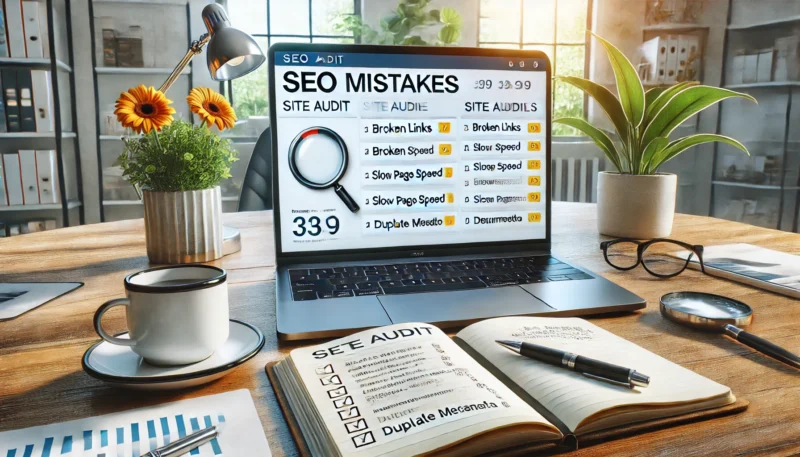You’re writing blog posts, using keywords, and building backlinks — yet your traffic isn’t growing. Sound familiar? The problem might not be your effort, but rather hidden SEO mistakes that are silently hurting your rankings and visibility.
In this article, we’ll break down the most common SEO errors (even experienced marketers make them) — and show you how to fix each one to get your traffic back on track.
1. Targeting the Wrong Keywords
Not all keywords are created equal. Many sites waste time chasing:
-
Keywords with too much competition
-
Keywords not aligned with user intent
-
Keywords that are too vague or irrelevant
✅ Fix It:
-
Do in-depth keyword research using tools like Ubersuggest, Ahrefs, or Google Keyword Planner
-
Focus on long-tail keywords with clear intent
-
Always match content to what users are actually searching for
2. Ignoring Search Intent
Ranking for a keyword is useless if your content doesn’t answer the question behind it. For example, someone searching for “best SEO tools” wants a comparison — not a definition of SEO.
✅ Fix It:
-
Understand the 4 types of intent: informational, navigational, commercial, transactional
-
Analyze top-ranking results to see what type of content Google is favoring
-
Align your format and tone with that intent
3. Thin or Low-Quality Content
If your content is shallow, copied, or lacks value, it won’t rank — no matter how well-optimized it is. Google rewards content that’s comprehensive, original, and helpful.
✅ Fix It:
-
Aim for depth, not just word count
-
Include visuals, examples, FAQs, and actionable tips
-
Regularly update and improve older posts
4. Slow Website Speed
A slow-loading site drives visitors away and hurts your rankings. It also impacts Core Web Vitals, which are part of Google’s ranking factors.
✅ Fix It:
-
Compress images
-
Use a reliable hosting provider
-
Minify CSS/JS files
-
Run your site through PageSpeed Insights or GTmetrix
5. Not Optimizing for Mobile
With mobile-first indexing, if your mobile site performs poorly, your entire ranking suffers — even if your desktop version is perfect.
✅ Fix It:
-
Use a responsive design
-
Test with Google’s Mobile-Friendly Test
-
Avoid pop-ups or elements that block the screen
6. Missing or Duplicate Title Tags and Meta Descriptions
These elements are crucial for SEO and user click-through. Many websites have pages with generic or duplicate tags — or worse, none at all.
✅ Fix It:
-
Write unique, keyword-rich titles and meta descriptions for every page
-
Use SEO plugins (like Rank Math or Yoast) to catch duplicates
7. Broken Links and 404 Errors
Broken internal and external links degrade user experience and confuse search engines, reducing crawl efficiency.
✅ Fix It:
-
Regularly audit your site using tools like Screaming Frog or Ahrefs
-
Replace or redirect broken links
-
Use 301 redirects when you remove or rename pages
8. Poor URL Structure
Messy, unreadable URLs can hurt both SEO and user trust.
✅ Fix It:
-
Use clean, short URLs with keywords (e.g.,
/seo-tips-2025) -
Avoid random strings, dates, or session IDs
-
Separate words with hyphens, not underscores
9. Keyword Stuffing
Repeating keywords unnaturally to “trick” search engines doesn’t work anymore — and it can trigger a penalty.
✅ Fix It:
-
Focus on natural language
-
Use synonyms, related terms, and keyword variations
-
Prioritize user experience over keyword density
10. Not Using Internal Links
Internal linking helps distribute authority and keeps visitors on your site longer. Yet many pages are left as “orphans”, with no links pointing to or from them.
✅ Fix It:
-
Link related blog posts and pages together
-
Use descriptive anchor text
-
Add internal links from older posts to new ones — and vice versa
11. Neglecting Image Optimization
Images that are too large, lack ALT text, or use poor formats can hurt load speed and accessibility.
✅ Fix It:
-
Compress images before uploading
-
Use proper ALT text with descriptive keywords
-
Name files clearly (e.g.,
seo-strategy-2025.jpg)
12. Failing to Submit a Sitemap
Without an up-to-date sitemap, search engines may miss important pages on your site — especially if they’re buried in your structure.
✅ Fix It:
-
Generate an XML sitemap
-
Submit it via Google Search Console
-
Keep it updated as you add/remove content
13. Not Monitoring Performance
Many creators hit “publish” and never check back. Without data, you won’t know what’s working — or what’s broken.
✅ Fix It:
-
Set up Google Search Console and Google Analytics
-
Track metrics like impressions, clicks, bounce rate, and average time on page
-
Regularly audit top-performing (and underperforming) content
Final Thoughts: Small Fixes, Big Gains
SEO mistakes are common — but they’re also fixable. Sometimes, a few simple tweaks can unlock a dramatic increase in rankings and traffic.
Start by auditing your current content and site structure. Identify one or two of these issues that apply to you, and work on correcting them today. Over time, these small improvements will stack up and deliver long-lasting organic growth.

